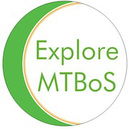One teacher's story of moving towards inquiry-based learning and peer collaboration in the math classroom.
Yesterday I presented at the Math In Action conference at Grand Valley State University. Below are my notes on the presentation and a pdf version of my PowerPoint (which means the videos don't show up).
| math_in_action_presentation-_gvsu.pdf |
I want to start out with some pictures of my classroom from this past year. My goal in showing you these isn’t so that you think I’m some wonderful teacher; it’s to give weight to what I’m saying. If I can do it, you can do it.
Several years back, I went to Western Michigan to get my Master’s degree in math education. When confronted with the research, it’s not hard to see the value in inquiry-based learning coupled with rich contexts in the math classroom...
___________________ (read more) ______________________
However, shifting my teaching has been a much more difficult process. It’s not that I didn’t want to do it; I didn’t know where to start. Having the opportunity to teach from Core Plus for a couple of years was helpful but I wasn’t trained in the process. Students were frustrated. I was frustrated. Then life happened: my school shifted curriculum, the State changed standards, I bounced around to a couple of different schools (my wife changed jobs, budget cuts, etc), I had kids, etc.
I’ve spent years collecting interesting real world contexts for my lessons but still had this underlying guilt that I wasn’t doing it right. My classes did fine compared to other math classes but my students weren’t actively engaged in exploring the material.
I decided to change that. If I can do this, you can do it. I currently have 6 preps 4 days a week and 7 preps on the other day. I have 3 children 4 and under in my house and I have a wife who works full time.
Start small. I don’t use problems or tasks for every topic. I still use direct instruction for some ideas. My goal was to incorporate at least 2 rich contexts or activities into each chapter for Algebra 1 and Algebra 2.
Talking points:
- How to start the process
- Some suggestions for organization
- Re-Working a Task
How to Start the Process
Online Resources to get you started:
Dan Meyer
I love what he does but I find the 3 Act lessons he puts out to be better suited for the middle grades.
· What I appreciate most about Dan is his reworking of textbook tasks.
· He has a mantra I find helpful:
o Get buy in from the students.
o Go up the ladder of abstraction.
o Be less helpful.
Fawn Nguyen
· Great investigatory tasks for Middle School and Algebra 1.
· She models how to have productive class conversations about math.
Geoff Krall
· EmergentMath.com
o This is the place to start.
· Common Core Problem Based Curriculum Maps
o From 5th grade through high school
o Treasure trove of tasks to get you started—especially Algebra 2 (those can be hard)
· #MTBoS (Math Twitter Blog-o-Sphere)
o This is THE place where math teachers gather and share ideas freely. This isn’t about sharing what you had for dinner.
o Twitter has been my best professional development decision in my 13 years of teaching.
· #alg1chat – Sundays at 9pm
· #alg2chat – Mondays at 9pm
· #MichED – Wednesdays at 8pm
o Teachers and administrators from around the state get together to discuss topics (voted on beforehand) ranging from educational technology to how to best engage students.
You do not have to reinvent the wheel to get started. Beg borrow and steal until you start to get a handle on how it works for you.
Actual Book:
5 Practices for Orchestrating Productive Mathematics Discussions by Margaret S. Smith and Mark K. Stein
· This book has been hands down the best resource I’ve come across for helping me structure productive discussions in my classes.
· I’m sure I read something in my masters studies coming close to this, but maybe I just wasn’t ready for it.
· Buy this book!
Suggestions for Organization of Online Resources
Evernote
· Organize everything you come across no matter what device or browser you happen to be using.
· Use tags to help find resources in the future: “Alg2, Quadratic, Activity, PrBL”
· Evernote WebClipper.
o http://evernote.com/webclipper/
· iOS device bookmark for Evernote Webclipper.
o http://mergy.org/2012/05/use-the-evernote-clipper-with-safari-on-ipad-and-iphone/
Text/Word Document
· General outline of what you currently do for your course.
· This takes a couple of hours but helps you organize your resources and keeps you from spinning your wheels.
· Twice a year (or more) go through your accumulated resources in Evernote and find a spot for them to go in your course.
o Be specific! Find the exact lesson you will replace this with.
o Only keep the top two or three resources.
Your Textbook
· Good source for rich tasks
o Project section at the end of the chapters
o Extension questions at the end of each section’s problem sets
· They often need reworked, but that can take less time than spending hours getting sucked into things online.
Re-Working a Task
Flashlights and Variation Equations – Alg 2
Use Core Plus Mathematics Project, Course 2, pg 10 (see pdf of ppt)
-used with permission
What do you notice about this task? Good? Bad?
How can we make the task more accessible?
· Can we delay the abstraction until later on?
· Can we reduce the literacy demand?
· Can we create an intellectual need?
o Students who complete this task do it because we tell them to, not because they’re interested.
o My attempt at a 3 Act version of this task.
Give groups of participants an opportunity to rework lessons into something better and then present their work.
 RSS Feed
RSS Feed



